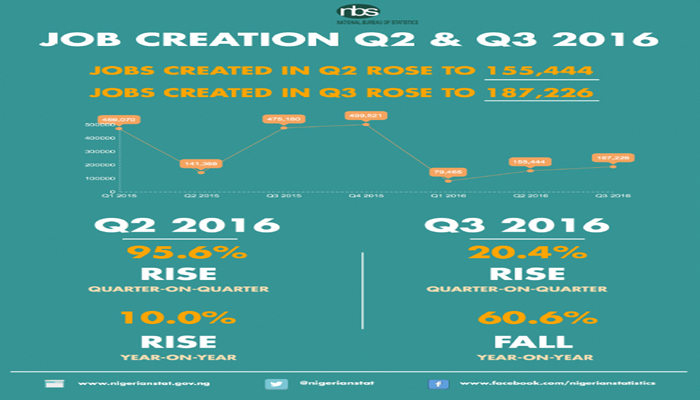Job generation declines by 60.6% y/y in Q3, 2016 – NBS
The total number of jobs generated in Nigeria in the third quarter of 2016 rose to 187,226 from the 155,444 in the second quarter, representing an increase of 20.4 per cent quarter on quarter, but a decline of 60.6 per cent year on year.
The Nigerian Bureau of Statistics explained the third quarter figures on its website.
The formal sector recorded 49,587 jobs, representing 26.5 per cent share of new jobs in the third quarter. The informal sector recorded a larger share of new jobs in quarter three when compared to the previous quarter, reporting a figure of 144,651 jobs, which represents 77.3 per cent of new jobs in quarter three.
According to NBS classification, the informal jobs are those generated by individuals or businesses employing less than 10 or those businesses operating with little or no structures e.g. those in Agriculture, Light Manufacturing, Trade, etc
The Public sector which are the Government Ministries, Departments, Agencies (MDAs), Government Parastatals, Academic and Research Institutions at Federal, State and Local government levels, again recorded a negative growth in employment, with a figure of -7,012 in quarter three.
“The reported negative growth in public sector job numbers over the last year has not been entirely surprising, as many state governments across the country have struggled to pay salaries, hence restricting the number of new intakes and in some instances placing a complete embargo on new employment into the public service”, NBS explained.
The NBS said overall, the magnitude of employment in the economy has not been sufficient or adequate to meet the ever-growing labour market; hence the continuous rise in the level of unemployment in the country which stood at 13.3% in Q2 and 13.9% in Q3 2016.
It said, however, despite negative economic growth since 2016, “the net jobs created still remains positive on the whole in both the formal and informal sectors meaning more jobs are being created despite job losses especially informal low paying jobs. Positive net formal jobs in both q2 and q3 2016 were driven by the human health and social services sectors as well as agriculture and accommodation and food services, which accounted for about 90% and was responsible for keeping net jobs created positive in both q2 and q3 2016.
“This reflects the current economic realities with only a few businesses still growing and employing, while many others are shedding jobs. While 18 of the 46 economic activities recorded negative net jobs created in q2 2016, 21 of the 46 economic activities recorded negative net jobs created in q3 2016.
“With the Nigerian labour force population rising by a five year average of over 2.6 million annually, the economy needs to generate the same level of jobs annually just to hold the unemployment rate at the current level of 13.9 per cent.
Between Q1-Q3 2016, 3.7 million people have entered the labour force with net jobs of 422,135 created within that period, giving a shortfall of 3.2million for Q1-Q3 2016. This has resulted in a rise in the combined unemployment and underemployment levels from 29.2% (10.4% for unemployment alone) at the beginning of 2016 to 33.6% (13.9% for unemployment alone) by end of Q3 2016”, the bureau explained.




